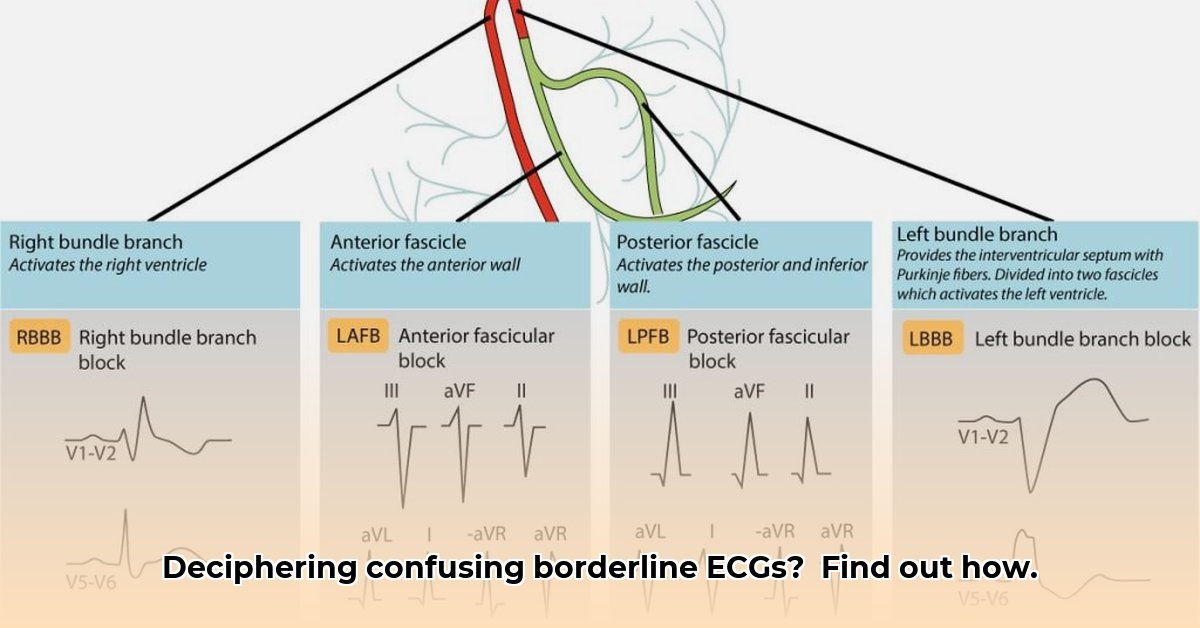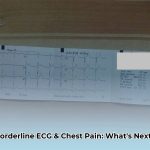Receiving a “borderline” ECG result can be unsettling. It’s natural to feel confused and worried about what it means for your heart health. This guide aims to provide clarity, helping you understand what a borderline ECG might indicate, the potential reasons behind it, and, most importantly, the necessary steps to take next. We’ll break down complex medical terms into plain English, empowering you to feel more confident and in control of your cardiac well-being. We’ll cover understanding your results, exploring possible causes, scheduling follow-up appointments, and adopting long-term heart health strategies. For more advice on discussing your results, see this helpful guide on talking to your doctor. Let’s navigate this together and equip you with the information you need to safeguard your heart.
Deciphering Your Borderline ECG: A Comprehensive Guide for Patients
Reduce anxiety and gain a clearer understanding of your borderline electrocardiogram (ECG) result and its implications for your cardiac health.
If you’ve received a borderline ECG result, you’re not alone! It’s a common occurrence and doesn’t automatically indicate a serious problem. Let’s simplify the information so you can feel more informed and empowered.
What Does “Borderline” ECG Really Mean?
Understand the concept of a borderline ECG result: a realm of subtle ambiguities in your heart’s electrical activity.
Think of your heart’s electrical activity as a symphony orchestra. An ECG (electrocardiogram) is like listening to that orchestra’s performance. A borderline result signifies that the ECG detected some slightly off-key notes – the heart’s rhythm exhibits minor irregularities, but not dramatically so. It’s neither clearly “normal” nor definitively “abnormal”—it resides in a gray area. This is precisely why further investigation is typically warranted. Consider it this way: your doctor requires additional information to gain a comprehensive understanding of the situation.
During the ECG test, the electrical signals that govern your heart’s beat were meticulously recorded. A borderline reading often indicates subtle inconsistencies in these signals. These minor irregularities could arise from temporary factors like stress or dehydration, or they might suggest an underlying issue warranting further evaluation. The inherent uncertainty is why additional tests are frequently recommended to provide clarity.
What Contributed to My Borderline ECG Result?
Explore the various possible factors: stress, electrolyte imbalances, technical glitches, and more.
Numerous factors can contribute to a borderline ECG result. It’s akin to a detective piecing together clues to solve a puzzle. Several possibilities need consideration:
- Stress and Anxiety: High stress levels can affect your heart’s rhythm, causing erratic beats.
- Electrolyte Imbalances: Electrolytes, such as potassium, calcium, and sodium, are essential for maintaining proper heart function. An imbalance—whether it’s an excess or deficiency—can disrupt your heart’s rhythm.
- Medication Side Effects: Certain medications can inadvertently affect your heart rhythm as a side effect. If you are currently taking medications it’s crucial to discuss them with your healthcare provider.
- Technical Issues: Occasionally, technical issues during the ECG recording can lead to a borderline result. While this is uncommon, it remains a possibility to consider. This is why paying attention to proper ECG lead placement is key to accurate results.
- Underlying Heart Conditions (Less Common): While less probable, a borderline ECG can sometimes indicate an underlying heart condition that requires attention. That’s because further testing is essential to rule this out.
Strategic Action Plan: Navigating the Next Steps
Your guide to action: scheduling follow-up appointments, discussing symptoms, preparing for tests, and adopting heart-healthy habits.
A borderline ECG isn’t a definitive diagnosis; rather, it serves as a signal prompting further investigation. Your doctor is your trusted partner in deciphering the meaning behind the results. Here’s a step-by-step approach to guide you:
-
Schedule a Follow-Up Appointment: This is the most critical initial step. Don’t postpone it! Reach out to your doctor to discuss your results and any concerns you may have. They will help you understand the implications of the results in the context of your overall health.
-
Open Communication About Your Symptoms: Honest communication is paramount. Share any symptoms you’ve experienced with your doctor, even if they seem minor. This could encompass:
- Chest pain or tightness
- Shortness of breath, even with mild exertion
- Rapid or fluttering heartbeat (palpitations)
- Lightheadedness or dizziness
- Unusual feelings of fatigue
-
Potential Further Tests: Depending on your situation, your doctor may recommend further tests to gain deeper insights into your heart’s health. These could include:
- Stress Test: This entails monitoring your heart’s activity while you exercise.
- Echocardiogram: This test employs ultrasound to create images of your heart’s structure and function.
- Holter Monitor: A small, wearable device that continuously records your heart rhythm over a period of 24 to 48 hours.
-
Lifestyle Adjustments: Regardless of the test outcomes, adopting healthy lifestyle changes is always a prudent decision for promoting optimal heart health. Integrate these modifications into your routine:
Lifestyle Change Benefits How to Start Regular Exercise Strengthens heart, improves blood flow Aim for at least 30 minutes of moderate activity Healthy Diet Supports heart function, lowers blood pressure Emphasize fruits, vegetables, lean proteins Stress Reduction Lowers blood pressure, improves heart health Explore yoga, meditation, or deep breathing. Quit Smoking (If Applicable) Dramatically reduces heart disease risk Seek support and resources to quit. Moderate Alcohol Intake Follow recommended guidelines If you drink, do so in moderation -
Medications Review: If you are currently taking any medications, ensure you discuss them with your healthcare provider. Certain medications can influence your heart rhythm, and any potential interactions should be carefully evaluated.
Personalized Risk Assessment
Understand how age, family history, and pre-existing conditions influence your risk assessment for heart-related issues.
While a borderline ECG often doesn’t warrant excessive worry, your overall risk factors influence how your doctor interprets the results. Take these factors into account:
- Your age (risk generally increases with age)
- Family history of heart disease
- High blood pressure
- Elevated cholesterol levels
- Diabetes
Your doctor will assess these factors alongside your ECG results to provide the most appropriate recommendations for your care.
Remember, a borderline ECG is not a life sentence. It’s an opportunity to take proactive steps to safeguard your heart health. Open communication with your healthcare provider is paramount. While this guide aims to provide information and reassurance, your doctor will guide your treatment plan, tailored to your specific needs.
Frequently Asked Questions (FAQ)
This section will be updated with commonly asked questions in a future version.
Understanding Borderline ECG Results for Enhanced Patient Care
Improve patient outcomes with accurate interpretation, further examinations, and lifestyle changes for heart health.
Key Takeaways:
- Borderline ECGs are relatively common, often arising from benign factors such as stress or minor electrolyte imbalances, and are not necessarily indicative of serious heart disease.
- A borderline ECG result typically requires further investigation to rule out any underlying cardiac issues. This often involves additional tests, such as stress tests or echocardiograms.
- Lifestyle adjustments, encompassing stress management techniques and a heart-healthy diet, play a pivotal role in promoting overall cardiovascular well-being, regardless of the ECG outcome.
- Understanding your ECG results and proactively engaging with your healthcare provider are critical for making informed decisions about your heart health.
- While technology like AI-assisted ECG interpretation is enhancing accuracy, a thorough clinical assessment remains paramount in ensuring appropriate patient care.
Decoding Borderline ECG Results
Unravel the complexities: a borderline ECG signifies uncertain signals, not always indicative of serious problems.
Receiving a borderline ECG report can understandably evoke apprehension. It signifies that your electrocardiogram – the test that meticulously records your heart’s electrical activity – revealed some unusual findings that aren’t definitively normal or abnormal. Consider it akin to a blurry photograph: it offers some information, but the details aren’t entirely clear. It doesn’t automatically signal a serious problem. Numerous factors can contribute to borderline results, spanning from stress and medication usage to even minor electrolyte fluctuations.
Unveiling the Reasons Behind Inconclusive Results
Explore reasons for unclear findings – further checks are crucial for assessing potential underlying cardiovascular problems
Several factors can contribute to an inconclusive ECG result, necessitating further evaluation. Your doctor may recommend additional tests to gain a clearer understanding of your heart’s condition. This might involve a stress test (to assess your heart’s response to exertion), an echocardiogram (to visualize your heart’s structure and function), or further blood work to assess electrolyte levels and other relevant markers. These examinations are essential in determining whether your atypical ECG is significantly linked to an underlying cardiovascular problem.
Charting the Course: Next Steps
Clarify the immediate action plan: engaging with your doctor, understanding test specifics, and implementing lifestyle changes for improved health.
Your doctor is your invaluable resource for interpreting your borderline ECG result and guiding you through the subsequent steps. It’s not advisable to navigate this terrain entirely on your own. Don’t hesitate to pose questions:
- What specific aspects of my ECG were unusual? Understanding the details is crucial for
- Best Mindfulness Books for Anxiety, Sleep, and Daily Peace - January 29, 2026
- Books On Mindfulness For A Happier, More Present Life - January 28, 2026
- Essential Meditation Books for Beginners and Experienced Practitioners - January 27, 2026
















